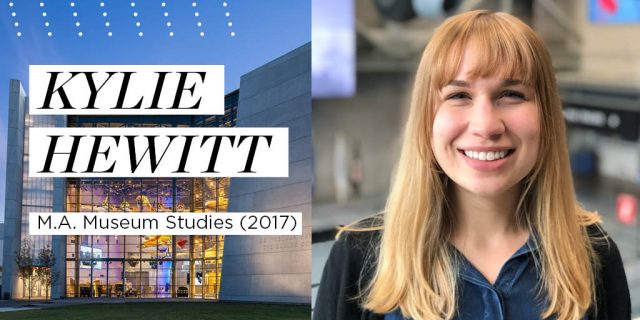
Objects from the past can speak volumes about the world we live in today. From love letters sent across continents and long-forgotten diary entries to flight logs, maps, and military records, every historic document has a story to tell.
As a digital archives technician at the National WWII Museum in New Orleans, KU alumna Kylie Hewitt (M.A. Museum Studies, 2017) is seeking to uncover stories from items within the museum’s collection of nearly 250,000 artifacts to better understand the past and how historic events shape the present. But identifying the stories is only part of the work — by converting documents to a digital format, Kylie is helping to make museums and archives more accessible by bringing their stories to a wider audience.
What are your research interests and why did you choose them? Was there a moment when you decided this is what you wanted to study? What was that journey like?
Generally speaking, my research interest was in culture. I lived on Saipan from ages 5-10 and it exposed me to a multitude of cultures that had to coexist in a small space. I decided to study anthropology at my undergrad university (Kansas States University) and was convinced that I would eventually be working for an international organization that assisted people. My path changed after visiting the United States Holocaust Memorial Museum the summer before my junior year. The museum had a temporary exhibit on modern day genocides which helped me to see that as much as museums are about the past, they can still relate to the present.



I took a museum studies course that following school year and signed up for a summer internship. My summer at the Kansas Cosmosphere solidified my decision to work in museums and I began to look into what I needed to do in order to get into a Museum Studies program. I took a year off between undergrad and grad school to gain more museum experience and was accepted into KU’s program in 2015.
Tell us about what you are doing now. How did you choose that path, and what has that experience been like?
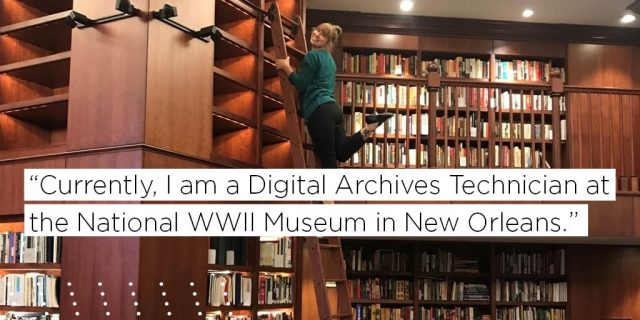
Currently, I am a Digital Archives Technician at the National WWII Museum in New Orleans. During my last year of grad school, I visited the museum and fell in love with it. A posting came up for my job around graduation, I applied, and here I am.
My duties include processing archival collections, preparing stable collections for digitization, assigning said collections to volunteers, and ensuring that internal goals are met. Before this digitization workflow was created, I updated the scanning procedures so it complied with the standards set by the National Archives and Records Administration and retrained our scanning volunteers. I also created the metadata template we use for the scans before they are published on our website.
How did your KU degree prepare you for your current job?
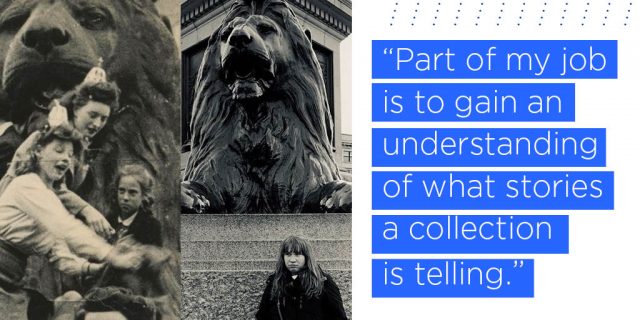
The major courses that prepared me for my job were Preventive Conservation and Women, Gender and Sexuality in the Archives. Preventive Conservation taught me how to properly handle and house material whereas WGS in the Archives helped me to better understand how to research and look for marginalized voices in museums and archives. Part of my job is to gain an understanding of what stories a collection is telling. The obvious story is an individual’s military experience during WWII, but if you pay attention there is a wealth of information about social norms, food, and other aspects of culture in the letters, diaries, newsletters, and photographs that we process.
What advice would you give to current graduate students?
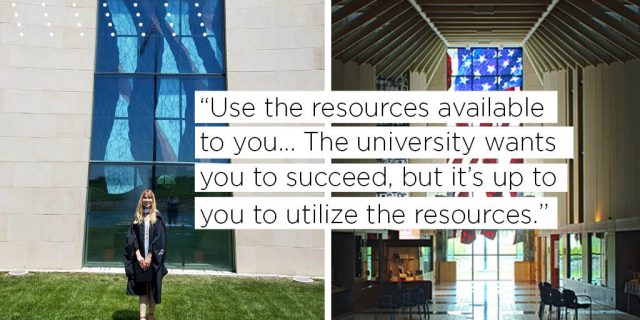
Use the resources available to you: Make an appointment with CAPS if you’re stressed out; have the Career Center review your resume; ask a professor if they know of any opportunities that can get your foot in the door. The university wants you to succeed, but it’s up to you to utilize the resources.
Give a shout-out to a professor, mentor, advisor, or someone at KU who has helped you?
I cannot thank the Dole Institute of Politics enough. My job as the Collections Assistant in the Dole Archives had such a major role in getting me to where I am today. The Archives team ensured that I grew as a young professional and helped me as much as they could. The scanning procedures I created at The National WWII Museum were largely based off of the Dole Archives’ because I knew they were tried and tested.
I also have to thank Melissa Fisher Isaacs, who mentored me at the Lawrence Public Library during my Hall Center for Humanities fellowship. Amongst other things, she was the one who taught me what I know about metadata.
What would you tell your freshman self?
Probably the same advice I would give to graduate students. I would also add to get out of my comfort zone more than I did.
What motivates you?
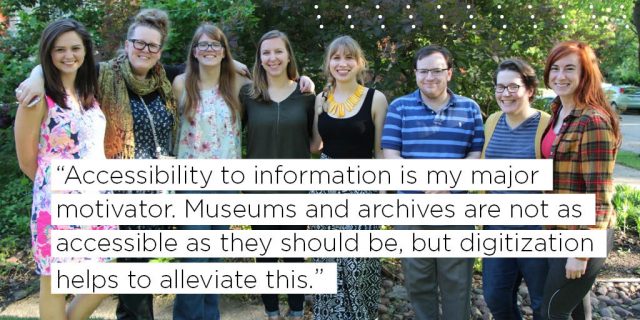
Accessibility to information is my major motivator. Museums and archives are not as accessible as they should be, but digitization helps to alleviate this.
Be like Kylie. Seek out resources that will set you up for success. For more information, explore the Museum Studies Program and the Dole Institute of Politics at the University of Kansas. Learn more about the National WWII Museum by visiting their website.